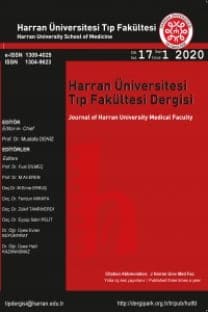Hipertermi ve Plazma membranı Ca ATPaz: HT’nin PMCA Üzerinde Herhangi Bir Etkisi Var mı?
Giriş ve Amaç:Hipertermi (HT) ile kanser hücrelerini
tedavi etme fikri en az 5000 yıl öncesine dayanır.
Kanser araştırmalarındaki geçmiş teknolojiler,
özellikle derin çekirdekli tümörlerde, tam olarak etkili
ve homojen bir ısıtma sağlayamadığından dolayı
modern kanser araştırmalarında HT’ye ilgi eksikliğine
sebep oldu. Ayrıca, HT'nin kanser hücrelerinde
apoptozu indüklediği bilinmektedir. Öte yandan,
plazma membranı Ca ATPaz (PMCA), apoptoz
yolaklarında önemli bir pompadır. PMCA, hücredeki
Ca iyonlarını hücrenin dışına pompalar. Bu çalışmanın amacı HT'nin PMCA kinetik parametrelerine etkisini
değerlendirmektir.
Yöntem:PMCA üzerinde HT'nin etkisini
değerlendirmek için, kırmızı kan hücrelerinin plazma
membranı kullandık. Sağlıklı donörden izole edilen
insan kırmızı kan hücreleri, termomikser kullanılarak
30 dakika, 60 dakika, 90 dakika, 120 dakika boyunca
37oC, 44oC, 50oC'de ısıtıldı. Eritrositler (39ul) lizis
çözeltisi 1,7ml eklendi ve 15 dakika inkübe edildi.
İnkübasyon sırasında karışım hafifçe karıştırıldı.
Karışım 0°C'de 20 dakika için 17000 xg'de santrifüje
tabi tutuldu. Bunlar, 1,7 ml KCl tampon içinde yeniden
süspansiyona alınmış ve tekrar santrifüje tabi
tutulmuştur. Daha sonra, eritrositlerden hemoglobin
çıkarılır. Bundan sonra, 0.4 ml'lik bu boş eritrosit
süspansiyonu, Indo 1FF-AM ile 0.1 ml tampon ile
karıştırıldı. Bu süspansiyon, buz üzerinde 15 dakika
inkübe edildi. Bu boş eritrositler 37°C'de 45 dakika
inkübe edilerek tekrar kapatılmış ve kullanıma kadar
buz üzerinde depolanmıştır.
Sonuçlar:Kalsiyum konsantrasyon seviyelerine göre
kontrol ile diğer sıcaklık arasında belirgin farklar
vardır. Ayrıca, 37oC ile diğer sıcaklık arasında belirgin
bir fark vardır. PMCA 37oC üzerindeki sıcaklıklarda
çok iyi çalışmadı. Bu nedenle, yüksek kalsiyum
konsantrasyonu ölçüldü.
Pompa düzgün bir şekilde çalışıyorsa, kalsiyum
konsantrasyon seviyesi zamanla azalacaktır. Aksine,
eritrosit keseciklerinde artan kalsiyum konsantrasyon
seviyeleri ölçtük. HT’ye maruz kalan PMCA, yüksek
sıcaklıktan etkilenir ve PMCA çalışmaz, böylece Ca
iyonları hücrelerden dışarı çıkamaz. Hücre ölümü
ısının etkisi ile bozulan PMCA kinetiğinden dolayı
tetiklenmektedir.
Anahtar Kelimeler:
PMCA, Ca görüntüleme, Hipertermi
Hyperthermia and Plasma Membrane Ca ATPase: Is There Any Effect of HT on PMCA?
Introduction and Aim: The idea of treating cancer
cells with hyperthermia (HT) is based on at least 5000
years back. Past technologies in cancer research could
not deliver effective and homogenous heating to all
cites, especially in deep-seeded tumors. This is the
main reason for lack of interest in modern cancer
research. Also, HT is known to induce apoptosis in
cancer cells. On the other hand, Plasma membrane Ca
ATPase (PMCA) is an important pump in apoptosis
pathways. PMCA pumps Ca ions in the cell to the
outside of the cell. The aim of the present study is to
evaluate the effect of HT in the kinetic parameters of
PMCA.
Materials and Methods:To evaluate the effect of HT
in PMCA, we used red blood cells plasma membrane.
Human red blood cells which isolated from the healthy
donor were heated at control, 37oC, 44oC, 50oC
during 30min, 60min, 90min, 120min by using
thermomixer. 1,7ml Lysis solution were added to
Erythrocytes (39ul) and incubated for 15 minutes.
During the incubation, the mix was gently stirred. The
mix was centrifuged at 17000xg for 20 minutes at 0oC.
They were resuspended in 1,7ml KCl buffer and
centrifuged again. Then, hemoglobin removed from
erythrocytes. After that, 0.4ml of this empty
erythrocytes suspension was mixed with 0.1ml buffer
with Indo 1FF-AM. This suspension was incubated for
15min on ice. These empty erythrocytes were resealed
by incubation at 37°C for 45 min and stored on ice until
use.
Results:According to calcium concentration levels,
there are significant differences between 0oC and the
other temperatures. Also, there is a significant
difference between 37oC and the other temperatures.
PMCA did not work very well at the temperatures over
37oC. So we measured high concentration levels of
calcium in the erythrocytes.
Conclusion:If the pump worked properly, we had to
see decreasing concentration levels of calcium with
time. On the contrary, we measured growing
concentration levels of calcium in the erythrocytes.
Then, HT effects to PMCA and when PMCA does not
work, Ca ions cannot go out from the cells. As a result,
calcium overloading is one of the consequences of
apoptosis.
Keywords:
PMCA, Ca imaging, Hyperthermia,
___
- 1. Ahmed K, Tabuchi Y, Kondo T. Hyperthermia: an effective strategy to induce apoptosis in cancer cells. Apoptosis. 01 Kasım 2015;20(11):1411–9. 2. L-G LFF. Pathological Effects of Hyperthermia in Normal Tissues. Cancer Res. 01 Ekim 1984;44(10 Supplement):4826s–4835s. 3. Richter K, Haslbeck M, Buchner J. The Heat Shock Response: Life on the Verge of Death. Mol Cell. 22 Ekim 2010;40(2):253–66. 4. Bruce JIE. Metabolic regulation of the PMCA: Role in cell death and survival. Cell Calcium. 08 Haziran 2017; 5. Lew VL, Daw N, Perdomo D, Etzion Z, Bookchin RM, Tiffert T. Distribution of plasma membrane Ca2+ pump activity in normal human red blood cells. Blood. 01 Aralık 2003;102(12):4206–13. 6. Kubitscheck U, Pratsch L, Passow H, Peters R. Calcium pump kinetics determined in single erythrocyte ghosts by microphotolysis and confocal imaging. Biophys J. Temmuz 1995;69(1):30–41. 7. Shaklai N, Yguerabide J, Ranney HM. Interaction of hemoglobin with red blood cell membranes as shown by a fluorescent chromophore. Biochemistry (Mosc). 13 Aralık 1977;16(25):5585–92. 8. Strehler EE, Zacharias DA. Role of alternative splicing in generating isoform diversity among plasma membrane calcium pumps. Physiol Rev. Ocak 2001;81(1):21–50.
- ISSN: 1304-9623
- Yayın Aralığı: Yılda 3 Sayı
- Başlangıç: 2004
- Yayıncı: Harran Üniversitesi Tıp Fakültesi Dekanlığı
Sayıdaki Diğer Makaleler
In-Vitro Elektropermabilizasyon İçin Elektrik Alanın Sonlu Elemanlar Analizi
Serdal ARSLAN, Meriç Arda ESMEKAYA, Ayşe Gülnihal CANSEVEN
Hipertermi ve Plazma membranı Ca ATPaz: HT’nin PMCA Üzerinde Herhangi Bir Etkisi Var mı?
Armağan CANER, Müge Gülcihan ÖNAL
Çiğdem GÜNGÖRMEZ, Hatice Gumushan AKTAS, Ersin BORAZAN
Stage II Kolon Kanserinde Tümör Süpressör miRNA olan miR-143, miR-145 ve miR-192’nin Ekspresyonu
Çiğdem GÜNGÖRMEZ, Hatice Gumushan AKTAS, Ersin BORAZAN
Şanlıurfa’daki Prostat Kanseri Hastalarında VGSC’lerin İmmünohistokimyasal Olarak İncelenmesi
